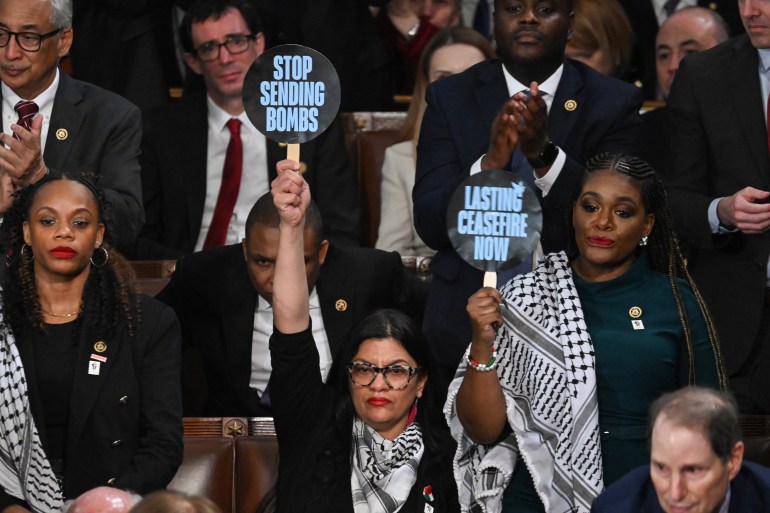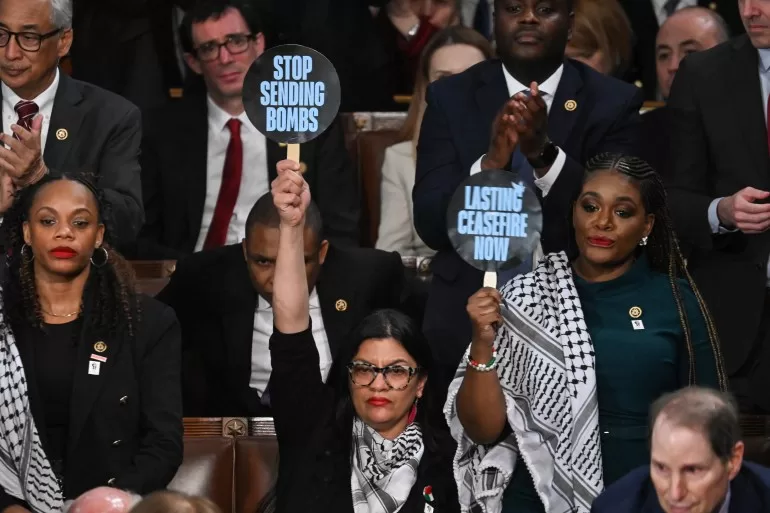But while her words seemed to echo calls for an end to Israel’s war, critics say she fell short of announcing a real policy shift.
Speaking in Selma, Alabama, on March 3 to commemorate a 1965 civil rights march, Harris drew attention to the ongoing human rights crisis in Gaza, which has been the subject of a relentless Israeli bombing campaign since October.
“Given the immense scale of suffering in Gaza, there must be an immediate ceasefire,” she said, adding: “for at least the next six weeks”.
The administration of US President Joe Biden had largely avoided calling for a ceasefire up to that point. Still, Palestinian rights advocates have zeroed in on Washington’s language to highlight how, while the administration’s choice of words may have changed, its position has not.
Biden and his officials have long called for a pause in the fighting to get Israeli captives out of Gaza and more aid into the territory. But they have stopped short of pushing for an end to Israel’s military offensive.
Sandra Tamari, the executive director of the Adalah Justice Project advocacy group, said Biden’s position does not satisfy their rallying cry for a permanent ceasefire in Gaza.
“As a Palestinian, I feel gaslighted every day by this administration,” Tamari told Al Jazeera. “Biden really thinks that we’re stupid and that we can’t see through this propaganda.”
Pause versus permanent ceasefire
The US government has been working to secure a deal that would see a temporary suspension of the fighting, in exchange for the release of the nearly 130 Israelis held captive in Gaza by Hamas and other groups. Washington has also said such a pause would increase the flow of humanitarian aid to the besieged Palestinian territory.
Biden’s Democratic allies have cited his efforts to strike a truce as a rebuttal to criticisms that he has not gone far enough to end Israel’s war in Gaza.
“Is the #CeasefireNow chorus going to pressure Hamas to enter into a ceasefire?” US Congressman Ritchie Torres asked on social media last month, commenting on a New York Times headline that described Hamas as “dashing Biden’s hopes of a near-term deal”.
But rights advocates have tried to highlight the difference between Biden’s push for a temporary truce and the enduring peace they seek. That is why many activists have been adding the qualifiers “lasting” and “permanent” to their demands for a ceasefire.
Beth Miller, the political director for Jewish Voice for Peace Action, said it is “unacceptable” that Biden is only calling for a pause in the fighting while refusing to use US leverage to end Israel’s war. The US, after all, sends billions of dollars worth of aid and weapons to Israel each year.
“We are calling for an immediate and permanent ceasefire that will end the bombardment and the killing of Palestinians in Gaza. That is what we are demanding when we are calling for a ceasefire,” Miller told Al Jazeera.
“That is the only way to prevent and to stop this unfolding genocide. It is the only way for hostages to be released. It is the only way for the siege to be lifted and for there to be moving forward a path where people can actually live in peace and in justice.”

For now, though, the Biden administration has yet to call for an end to the war. In a Ramadan message on Tuesday, Secretary of State Antony Blinken referred to a possible truce as a ceasefire.
“The humanitarian situation in Gaza is heartbreaking,” Blinken said in a statement.
“As we deliver additional aid to Gaza, we will continue to work non-stop to establish an immediate and sustained ceasefire for at least six weeks as part of a deal that releases hostages.”
Earlier this year, however, the Biden administration put forward a different definition for a ceasefire.
The White House’s National Security Council spokesman John Kirby told reporters on January 22 that the US only wants a temporary pause to the fighting — something he framed as distinct from calls for a ceasefire.
“We don’t support a general ceasefire, which is usually put in place in the expectation that you’re going to end a conflict, that it’s going to lead to specific negotiations,” Kirby said at that time.
‘Not a ceasefire’
In recent weeks, Biden himself has been using the word ceasefire regularly while addressing the conflict.
“My national security adviser tells me that we’re close. We’re close. We’re not done yet. My hope is, by next Monday, we’ll have a ceasefire,” the US president said on February 26, while eating ice cream in New York.
Josh Ruebner, an adjunct lecturer at Georgetown University’s Justice and Peace programme, said the rhetorical shift within the administration shows it is responding to popular pressure in support of a ceasefire. But he emphasised that the term itself does not signal a policy shift.
“What the Biden administration is advocating for is a temporary pause in the fighting to last six weeks to get Israeli hostages out, to get the clock past the time when Ramadan is taking place, so that Israel can then resume its genocidal actions against Palestinians in the Gaza Strip,” Ruebner told Al Jazeera.
“And that, of course, is not a ceasefire at all.”
Usamah Andrabi, a spokesperson for Justice Democrats, a left-wing advocacy group, stressed that progressives have been calling for a lasting ceasefire that would not allow Israel to carry on “bombing and destroying Gaza” after a few weeks.
“The cause of this ethnic cleansing and genocide is Israel’s assault on the Palestinian people. And allowing that to continue in any fashion is unacceptable,” he told Al Jazeera.
